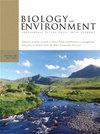干旱的机构管理和规划:爱尔兰和加拿大安大略省的比较
IF 0.6
4区 环境科学与生态学
Q4 ENVIRONMENTAL SCIENCES
Biology and Environment-Proceedings of the Royal Irish Academy
Pub Date : 2023-01-01
DOI:10.1353/bae.2023.a905271
引用次数: 0
摘要
摘要:2018年的严重干旱促使爱尔兰当局共同努力,建立了一套针对干旱风险的正式规划程序,作为更广泛的国家水资源管理战略的一部分。爱尔兰经历了20多年的重大社会经济干旱,但最近重建的长期数据表明,干旱在这里比以前想象的要频繁得多。由于气候变化的影响可能会影响未来几十年降水的时空分布,因此需要进一步的规划和准备,以减少爱尔兰水系统对干旱的脆弱性。在本文中,我们报告了爱尔兰干旱管理计划和政策与加拿大安大略省西南部干旱管理计划和政策的系统比较结果,该地区具有许多相似的干旱风险因素和管理挑战,但长期以来建立了管理干旱的制度实践。该项目对爱尔兰水资源管理人员提出的主要建议包括:在爱尔兰公众中培养节约用水的文化;利用集水区作为干旱监测和管理决策的空间单元;建立常设干旱管理小组,使主要利益攸关方和用户群体参与并扩大其范围;并进一步完善数据收集,以支持规划应对与气候变化相关的未来挑战。寻求爱尔兰水资源管理人员与其他司法管辖区的同行之间进行点对点学习的未来机会,是在爱尔兰背景下制定干旱管理最佳做法的更广泛机会。本文章由计算机程序翻译,如有差异,请以英文原文为准。
Institutional Management and Planning for Droughts: A Comparison of Ireland and Ontario, Canada
ABSTRACT: Severe drought conditions in 2018 prompted concerted efforts by Irish authorities to establish a formal planning process for drought risks as part of the wider national water management strategy. More than two decades had passed since Ireland had experienced a socioeconomically significant drought, but recently reconstructed long-term data have shown that drought is a much more frequent hazard here than previously thought. With climate change impacts likely to affect the temporal and spatial distribution of precipitation in coming decades, there is an ongoing need for further planning and preparation to reduce the vulnerability of the Irish water system to droughts. In this article we report results of a systematic comparison of Irish drought management plans and policies with those in southwestern Ontario, Canada, a region that shares many similar drought risk factors and management challenges but has longer established institutional practices for managing droughts. Key recommendations for Irish water managers emerging from this project include fostering a culture of water conservation among the Irish public; using catchments as the spatial unit for drought monitoring and management decisions; creation of standing drought management teams that involve and broaden key stakeholders and user groups; and further refining data collection to support planning for future challenges associated with climate change. Pursuing future opportunities for peer-to-peer learning between Irish water managers and their counterparts in other jurisdictions is a wider opportunity for developing best practices for drought management in the Irish context.
求助全文
通过发布文献求助,成功后即可免费获取论文全文。
去求助
来源期刊
CiteScore
1.10
自引率
0.00%
发文量
6
审稿时长
>36 weeks
期刊介绍:
The journal aims to offer a broad coverage of the subject area, including the following:
- biology and ecology of the Irish flora and fauna
- microbial ecology
- animal, plant and environmental physiology
- global change
- palaeoecology and palaeoclimatology
- population biology; conservation of genetic resources
- pollution and environmental quality; ecotoxicology
- environmental management
- hydrology
- land use, agriculture, soils and environment.
Submissions on other relevant topics are also welcome, and papers of a cross-disciplinary nature are particularly encouraged.

 求助内容:
求助内容: 应助结果提醒方式:
应助结果提醒方式:


